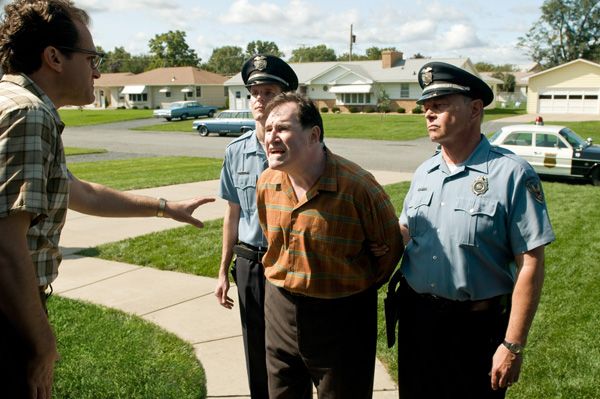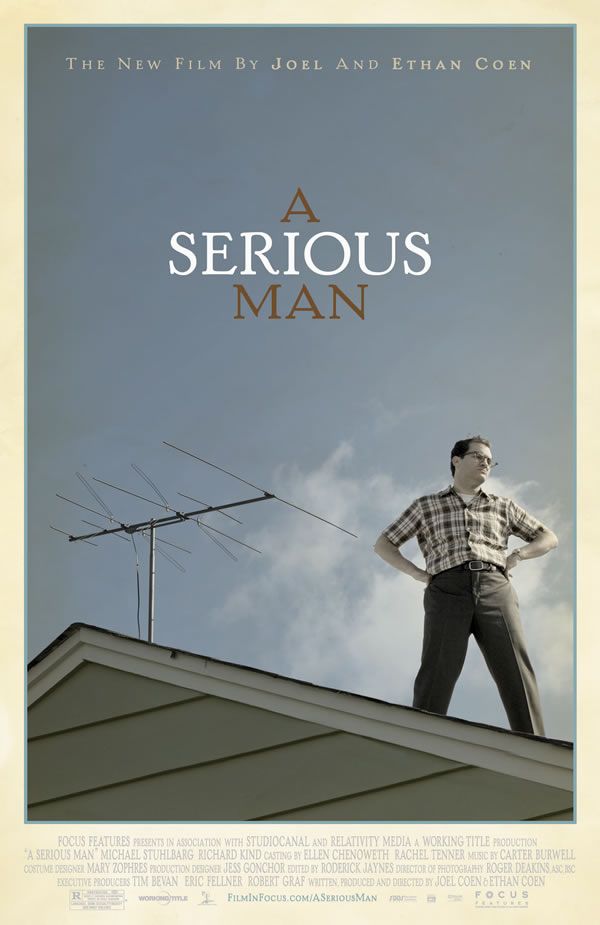Combined with "No Country for Old Men" and "Burn After Reading", The Coen Brothers' latest movie, "A Serious Man" could complete an unofficial "Existentialist Trilogy". "No Country" says that the world is an uncertain and unforgiving place. "Burn After Reading" says the same thing but the idea is played for laughs instead of drama. "A Serious Man" takes a different approach and wonders if uncertainty is so bad when certainty can be far worse. Furthermore, what good is reason if the world is an irrational place?
The film is perplexing right from its peculiar opening scene. While the film is set in the 1960s in a Midwestern Jewish community, the first scene takes place in the 1800s somewhere in Eastern Europe in a Jewish village. The scene begins as a Jewish man happily comes in from the cold to tell his unsmiling wife that he has just helped an old relative repair a wheel on his cart. The wife replies that her husband is mistaken, the relative has been dead for three years, and what her husband saw was a dybbuk (a Yiddish word used in this context to mean "evil spirit"). The husband laughs off this idea as he is "a rational man" and that there's no such thing as a dybbuk. Then the relative appears at the door and the husband believes him human while the wife believes it's an evil spirit. The husband invites the man in and after a brief and oblique conversation, the wife suddenly stabs the man to prove she's right. Both the husband and wife are certain but the husband responds with kindness and reason while the wife acts with violence and irrationality. Thus, the film begins with a parable meant to set the tone of the film yet it bears no resemblance to the rest of the movie beyond Judaism how the religion's celebration of tradition relates to the daily lives of its followers.
After the parable, the narrative begins and centers on Larry Gopnik, an honest professor, semi-observant Jew, a kind brother, a struggling husband and father, and a complete wimp. His wife is having an affair with a pretentious and sanctimonious jerk, his chance at tenure is tenuous, he has no emotional relationship to his entitled children, and the kindest person in his life is his broke and dim-witted brother who is constantly draining a cyst on the back of his neck. Everyone treats Larry so dismissively that an alternate title for the movie could be "The Mensch Who Wasn't There". There's also subplot involving Larry's son Danny who is preparing for his bar-mitzvah in between getting stoned and running from the tough classmate who he owes $20 for the pot. This subplot, like the parable, ties to the themes of the film but doesn't contribute to the progression of Larry's arc.
Hit with every sling and arrow life can throw at him, Larry decides to consult a succession of three rabbis in his attempt to find some spiritual answer to his worldly dilemmas. The conversations with the rabbis, like most aspects of "A Serious Man", relates more to the themes of the film but it also provides a crucial structure to a movie that would otherwise be unrelenting in its dark humor and cruelty towards Larry. But the main question of "A Serious Man" is whether or not it's better to dwell in uncertainty and actively participate in this world or to find comfort in constant misery even if misery is always near-certain. I wish I could go into greater depth about how the film tries to answer this question but I don't think I can do so without starting to spoil the film.
The themes are what make "A Serious Man" a memorable and fascinating picture, but don't think that the Coens have forgotten everything else that makes for a fantastic movie. The dark comedy, the slightly-off supporting characters, Roger Deakins' sly cinematography, Carter Burwell's melodic-yet-unobtrusive score, and the editing all make "A Serious Man" a movie that could only come from Joel and Ethan Coen.
But before you enter "A Serious Man", you should know that it is their most difficult movie since "Barton Fink". And when I say "difficult" I mean that you will probably exit the theater highly confused but that's great because this is a film that you'll keep turning over in your head and want to discuss with others. Also, I haven't even brought up the other ideas presented such as Judaism in modernity, the popular perception of Jews as neurotic, and the value of being a decent person. This is a rich and thoughtful movie but it's never so overbearing that it becomes dull.
I'm not sure if the Coens next movie, an adaptation of Charles Portis' novel "True Grit", will be another examination of existentialism, but those captured by the ideas in "No Country of Old Men" and "Burn After Reading" will find "A Serious Man" the most challenging and perhaps most rewarding entry in the series.
Rating ----- A



.jpg)

